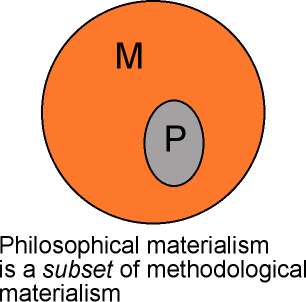
One last thing before I comment directly on intelligent design. Modern day scientists purposefully limit themselves to explaining natural phenomena using only natural causes. We have learned a lot about our world, our universe, by adopting a methodology of materialism, limiting ourselves to just matter, energy and their interactions. Adopting a materialistic methodology when doing science does not necessarily lead to philosophical materialism in which the existence of the supernatural, God, the spiritual dimension, "the More", is denied.

From the history of science, we see many examples of theists, those who believe in God, a transcendent spiritual reality, practicing a materialistic methodology. Isaac Newton, Gregor Mendel (the Austrian monk whose research with pea plants became the foundation of genetics), and Georges Lemaitre (the Belgian Roman Catholic priest who deduced from Einstein's General Relativity that the universe must be expanding and that it began expanding from a very tiny volume a long time ago—the Big Bang) come immediately to mind. There are many theist (not atheist!) scientists today who are methodological materialists when investigating nature. The Vatican astronomers and myself are examples as well as at least some of your other science faculty colleagues.
Why do scientists limit themselves to materialistic explanations? Several reasons: The empiricism of modern science, the testing of explanations, relies on the regularity of nature, that nature does follow rules or laws. Otherwise, we could not trust observations as evidence. How would we know if the observation wasn't the result of some supernatural whim? Controlled, repeatable experimentation would not be possible and any conclusions from them would not be reliable without assuming that supernatural entities are not intervening to violate natural regularities or laws. (Pennock quoted in Scott p. 249) Secondly, relying on supernatural explanations is a cop-out or a dead-end to deepening our understanding of the natural world. There would be no reason to continue looking for a natural explanation. When confronted with a very hard puzzle due to an inadequate theory or technology, we do not throw up our hands and say, "God did it" and leave it at that—end of inquiry. No, if a natural cause for something is not known, the scientific approach is to say, "I don't know yet" and keep on looking.
Finally, the "methods of science are inadequate to test explanations involving supernatural forces" (Scott p. 50). It is hard to do controlled experiments if one of the control variables is an omnipotent force. The scientist usually learns about nature by using controlled experiments in which only one thing at a time is varied to determine whether or not a particular situation, feature, or circumstance can be determined to be the cause of an observed effect. Well, as any theologian will tell you, you can't control God, "the More". You can't put God in a box (or test tube). (Fans of C. S. Lewis' Chronicles of Narnia will recall the Christ-like lion character, Aslan, is described as wild, "not like a tame lion".)
As a scientist, who is also a practicing member of one of the world's enduring religions called Christianity, I use science's materialist assumption to find out more about the creation authored by God. Using that materialistic assumption while applying the tool of science has actually led me to a greater appreciation for the artistry that surrounds us. But that appreciation for the artistry comes from my religious roots and I recognize that it is not a necessary result of scientific study.
| Assumptions of Science | Theory + attributes | Methodological Materialism |
| Evolution via natural selection | Imago Dei | ID beliefs: God-action detection |
| Irreducible Complexity | Specified Complexity |